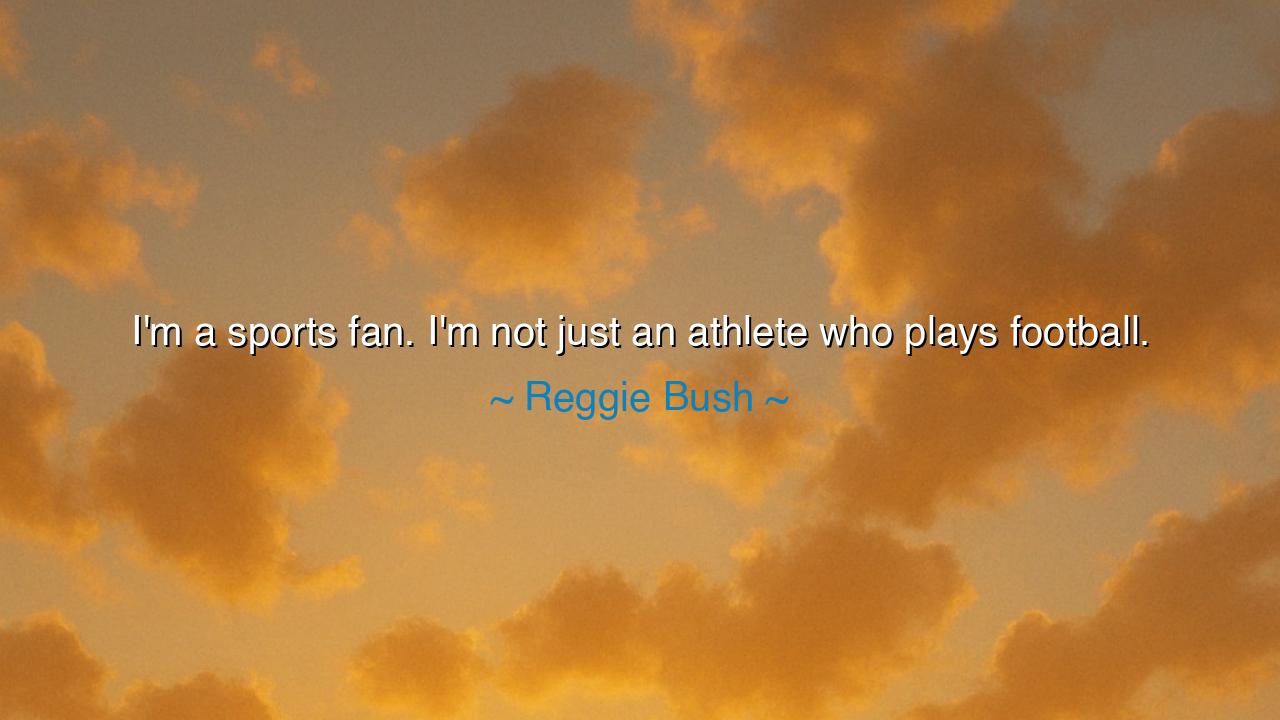
I'm a sports fan. I'm not just an athlete who plays football.






Hear the words of Reggie Bush, spoken with clarity and humility: “I’m a sports fan. I’m not just an athlete who plays football.” In these words lies more than a statement of personal interest; there is a revelation of identity, a reminder that even the greatest among us are not only defined by what they do, but by what they love. For to be a fan is to be human—to marvel, to admire, to celebrate the excellence of others, even when one carries excellence within oneself.
When he calls himself a sports fan, Bush places himself alongside the people who cheer from the stands, who rise from their seats at every touchdown, who gather around televisions in homes and taverns alike. He does not stand above them but among them. Though he is a man of the field, he is also a man of the crowd. This is a gesture of humility and connection, a reminder that even heroes are born from the same passions as those who worship them.
By saying he is “not just an athlete,” he points to the danger of narrow definitions. Too often, men and women are confined by their titles, seen only as their profession or their achievements. The football player becomes only a football player, the actor only an actor, the soldier only a soldier. Yet Bush reminds us that identity is greater than occupation. He is a man of passions, of interests, of curiosities, of joy—one whose life cannot be reduced to the lines of a field or the roar of a stadium.
History gives us examples of this truth. Consider Theodore Roosevelt, who was not only a president but also a soldier, a naturalist, a hunter, and a lover of literature. Had he allowed himself to be confined to one title, the world would have known only a fraction of his greatness. In the same way, Reggie Bush teaches that greatness expands when we embrace the fullness of who we are, not only the part that others celebrate.
His love for being a fan reveals another wisdom: that even those who inspire must also be inspired. No man is so great that he cannot look upward in admiration. This is the humility of the true champion, who recognizes that greatness is a shared flame. Today one may be the one cheered; tomorrow, the one cheering. In this exchange of admiration, humanity is bound together in respect and wonder.
The deeper meaning is that identity must be embraced in its wholeness. Bush speaks for all who feel confined by the labels society gives them. To be defined only by skill or by profession is to live in chains. But to declare, “I am not just what I do,” is to claim freedom. It is to remind oneself and others that the soul is larger than the stage upon which it performs.
The lesson, then, is clear: do not let the world reduce you to one thing. Be more than your work, more than your role, more than your reputation. Allow yourself the joy of being a fan, a learner, an admirer, a participant in life’s many arenas. The practical action is this: nurture passions beyond your craft. If you are an athlete, read poetry. If you are a scholar, sing songs. If you are a laborer, paint or play. For in this widening of self, you find not only balance but richness, and you remind the world that your humanity is greater than your title.
Thus, Bush’s words shine with wisdom for every generation: you are not just what you do. You are what you love, what you admire, what you celebrate. And in this fullness, life is not only performance, but participation in the grand game of humanity.






AAdministratorAdministrator
Welcome, honored guests. Please leave a comment, we will respond soon